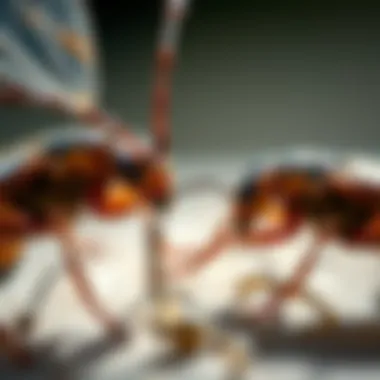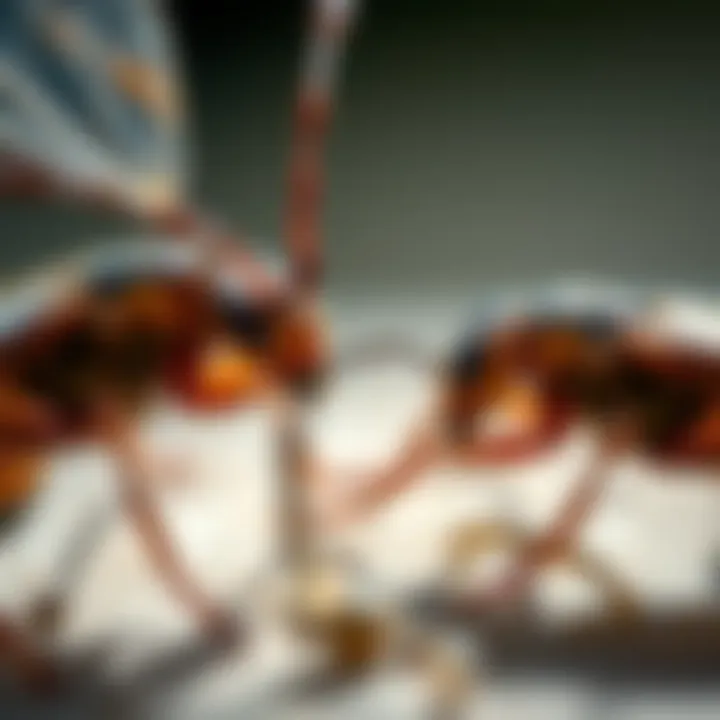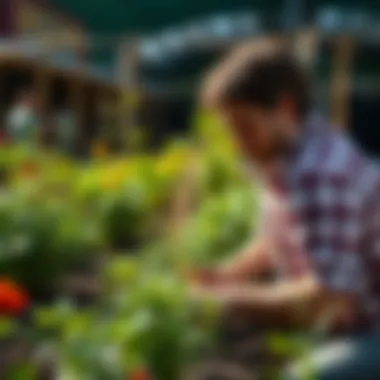Smart Pest Management Techniques in Shreveport


Intro
In Shreveport, the dance of nature mingles with urban life, leading to peculiar instances where pests can become uninvited guests in homes and gardens. Whether it’s ants marching in a straight line or mosquitoes buzzing around during twilight, these tiny intruders can wreak havoc. Homeowners and gardeners alike grapple with the challenge of managing these pests effectively and sustainably.
Understanding the local pest landscape is essential for effective management strategies. As we delve into this topic, the significance of pest identification becomes evident—knowing your enemy is half the battle. The article outlines a range of strategies, from prevention techniques to eco-friendly solutions, ensuring that residents can maintain a healthy living space without compromising the environment. Let's embark on this journey to empower you with the knowledge needed to reclaim your space from these critters.
Intro to Pest Management in Shreveport
Pest management in Shreveport is critical due to the area's unique climate, which creates a suitable habitat for various pests. Understanding how to effectively manage and control these pests is essential for homeowners and the community at large. This aspect not only protects homes but also ensures the safety of gardens, landscapes, and, most importantly, the health of residents. In short, dealing with pests efficiently is a priority for maintaining the comfort and livability of our spaces.
Understanding Local Pest Challenges
In Shreveport, pest challenges are as diverse as the local ecosystem itself. The warm, humid climate makes it a perfect breeding ground for many pests, ranging from common household nuisances like cockroaches and ants to more problematic species such as mosquitoes and termites.
- Cockroaches are not merely unsightly; they can bring allergies and asthma issues, particularly in children and sensitive individuals.
- Termites, although often overlooked, can cause significant structural damage if left unchecked.
- Mosquitoes are not just an itch at your barbecue; they are known carriers of diseases like West Nile Virus, underlining the importance of controlling their populations.
Homeowners must be aware of the specific pests prevalent in the region, as well as their life cycles and behaviors. An understanding of these local challenges allows for more targeted and effective pest management strategies that can really make a difference in keeping homes pest-free.
Importance of Regional Solutions
Regional pest control solutions are paramount in Shreveport because one size simply doesn’t fit all. Customizing strategies that address local conditions can yield better results than generic, national approaches.
- Tailored Approaches: Not every method that works in colder climates will be effective in Shreveport’s warm and wet conditions. For example, certain pesticide formulations are designed for specific environments and pest types. Local expertise creates more robust pest control measures.
- Community Knowledge: Engaging with local pest control professionals can provide insights that go beyond the basics. For example, they can offer advice on preventative measures that are particularly effective against pests like fire ants, which are prevalent in the South.
- Environmental Considerations: With an increasing emphasis on eco-friendly practices, regional strategies can incorporate sustainable methods such as introducing beneficial insects or using biological control methods, which are better suited for Shreveport's unique environment.
The advantages of understanding and employing regional solutions cannot be overstated. By staying informed, homeowners can protect not just their properties but also contribute to the environmental health of the greater Shreveport community. In sum, proactive planning and local knowledge are key components of effective pest management.
Common Pests Found in Shreveport
Understanding the common pests in Shreveport is crucial for effective pest management. These nuisances not only detract from the comfort of home environments but can also threaten the health of residents and the integrity of properties. Shreveport's warm climate, paired with its lush vegetation, creates an ideal breeding ground for various pests. Homeowners must recognize these common culprits to devise effective strategies for management and prevention, allowing for a more harmonious living space.
Identification of Household Pests
Household pests are the uninvited guests that seem to pop up from nowhere. In Shreveport, the most frequent offenders include ants, cockroaches, and bed bugs.
- Ants: These tiny creatures might appear harmless, but they can invade kitchens and pantries, searching for food. Notable species are the Argentine ant and the fire ant. Identifying them early can prevent a full-blown infestation.
- Cockroaches: Fast and elusive, roaches are health hazards. The German cockroach is common in homes and carries diseases. Knowing their hiding spots—like under sinks and in cabinets—is key to control.
- Bed Bugs: These pests are notorious for their stealthy nature, hiding in mattress seams and furniture. Bites can cause discomfort and sleepless nights, emphasizing the importance of identification.
By understanding these everyday pests, inhabitants can take proactive measures, effectively safeguarding their homes from future invasions.
Garden Pests: Threats to Vegetation
Gardening enthusiasts in Shreveport are particularly vulnerable to pests that can wreak havoc on their plants. Some of the most prevalent garden pests include aphids and caterpillars. Intervening swiftly can save a garden from significant damage.
- Aphids: Small, sap-sucking insects that can multiply rapidly. They weaken plants and can also attract other pests.
- Caterpillars: Different species of caterpillars, like the cabbage looper, can strip plants of their foliage. Knowledge of these pests helps gardeners implement measures to limit their impact.
Being vigilant and employing preventative methods is essential for maintaining healthy vegetation in Shreveport's gardens.
Seasonal Variations in Pest Activity
Pest activity in Shreveport doesn’t stay constant; it ebbs and flows with the changing seasons. Homeowners must be aware of these variations to effectively tackle pest-related issues.
- Spring: As temperatures rise, ants and cockroaches become more active, often building colonies near homes.
- Summer: The heat intensifies pest activity. Garden pests, such as aphids and spider mites, flourish during this time.
- Fall: Many pests begin seeking refuge for the winter, leading to increased indoor activity, particularly from rodents.
- Winter: While pest activity decreases, rodents might invade homes in search of warmth and food.
Keeping a close eye on these seasonal patterns can assist homeowners in preparing beforehand and mitigating potential pest issues.
Understanding these common pests and their seasonal behaviors is vital for effective pest management in Shreveport, allowing residents to take informed steps towards prevention.


Pest Prevention Techniques
Pest prevention is the cornerstone of effective pest management. This proactive approach not only mitigates the risk of infestations but also simplifies the control processes down the line. In Shreveport, where humidity and warmth can create a welcoming environment for various pests, understanding smart prevention techniques can save homeowners a great deal of headache and expense.
Preventing pests is often more straightforward than managing them post-infestation. By implementing solid strategies, residents can safeguard their homes and gardens, ensuring a healthier living environment. Key advantages of these techniques include reduced reliance on chemical treatments and the preservation of local ecosystems.
Preventative Measures for Homeowners
Homeowners can adopt several practical measures to keep pests at bay. Start by sealing any cracks or crevices around the home. An easy way to check for potential entry points is to do a simple walk-around. Look for gaps around windows and doors, as these often become highways for unwanted guests. Installing weather stripping and door sweeps can be a quick fix that pays off.
Keeping the yard tidy will also deter many pests. Regularly mow lawns, trim overgrown shrubs, and remove debris like leaves and branches. This not only looks good but also reduces hiding spots for pests.
Another often overlooked strategy involves storing food securely. Keeping pet food, birdseed, and other edible supplies in airtight containers can thwart many pests, especially ants and rodents. Moreover, maintaining a clean kitchen and promptly cleaning spills can fend off those pesky insects.
Sustainable Gardening Practices
For those who enjoy gardening, integrating sustainable practices can help keep pests away while nurturing the garden’s health. Certain plants, like marigolds and basil, naturally repel pests, making them excellent companions in your garden. It's like sending out an SOS to beneficial insects and discouraging troublemakers.
Moreover, composting organic waste can enhance soil health. Healthy soil leads to robust plants that can better withstand pest attacks. These plants often rely on less pesticide and chemical intervention, aligning with environmentally friendly practices.
Utilizing integrated pest management (IPM) is another effective route. This approach combines multiple strategies—ranging from biological control to habitat manipulation—reducing the need for harsh chemicals. By fostering natural predators, such as ladybugs that feast on aphids, you can maintain a balanced ecosystem.
Community Initiatives for Pest Awareness
Community-driven initiatives play a critical role in pest management awareness. Organizations in Shreveport often hold educational workshops and distribute resources to help residents understand local pest issues. These programs provide insights on preventive measures and encourage residents to share their experiences and solutions—creating a local support network.
One way to engage further is by participating in local gardening clubs or neighborhood associations that focus on pest management. These groups often share best practices, tips, and even host events that promote awareness about sustainable gardening and home pest management.
"Pest management isn’t just an individual effort; it’s a community challenge that benefits from collective knowledge and action."
Efforts like these foster a culture of vigilance within neighborhoods. Local governments or universities may even run initiatives geared toward educating the public on pest control, which helps everyone stay informed and proactive.
By implementing these preventative measures, embracing sustainable practices, and engaging with community initiatives, homeowners in Shreveport can significantly enhance their pest management strategies. Through collective awareness and action, pest problems can be noticeably reduced, leading to healthier homes and gardens.
Eco-Friendly Pest Control Solutions
Pest management isn’t just about eliminating the tiniest intruders in our homes and gardens; it’s about doing so responsibly. Eco-friendly pest control solutions represent a critical pivot in how we address pest issues today. Choosing methods that are kind to both the environment and beneficial to the local ecosystem is not merely a trend but a necessity in our rapidly changing world.
The importance of eco-friendly strategies cannot be overstated. They prioritize the health of our surroundings while effectively managing pest populations. Employing these solutions means harnessing the power of nature itself, which often provides resources that are already available, reducing the reliance on synthetic chemicals that can cause harm and pollution.
Natural Remedies for Common Pests
When it comes to dealing with pesky insects in the home, several natural repellent methods have proved effective. For example, vinegar can be an excellent deterrent for ants. Just mix equal parts of vinegar and water and spray it around entry points. Another handy solution is diatomaceous earth, which is made from fossilized algae. Sprinkling this chalk-like substance acts like a sandpaper trap for crawling insects, dehydrating them without the use of harmful chemicals.
- Garlic spray can ward off mosquitoes. Simply blend garlic with water, let it sit for a day, and then strain it before using it as a spray.
- Essential oils, such as peppermint, can also be effective against spiders and roaches; mixing them with some water in a spray bottle can create a pleasant-smelling deterrent.
These remedies not only target specific pests but also reflect a holistic approach to managing infestations, aligning with eco-conscious behavior.
Chemical Alternatives and Their Impact
Chemical pesticides offer quick results but can carry hidden costs. Their immediate effects might deceive homeowners into believing they’ve solved a problem, while the long-term repercussions can lead to pesticide resistance among pests, which makes future control even more challenging. Every time one of these products is used, the potential for environmental damage also increases.
- Research shows that many synthetic pesticides can leach into groundwater, impacting drinking water supplies. This is an ongoing concern in areas like Shreveport, where water conservation and quality are vital.
- There are alternatives that mimic the action of traditional pesticides without their adverse effects, like insecticidal soaps and botanicals derived from plants. These not only reduce chemical exposure but also promote biodiversity in gardens and surrounding areas.
Overall, understanding the implications of chemical use is crucial. The focus should not only aim for eradication but also ensure that the environment remains intact.


Integrating Pest Management Strategies
A well-rounded approach combines various methods to create an effective plan. Integrated Pest Management (IPM) advocates for a blend of techniques tailored to local conditions and species. By assessing the specific pest problem at hand, options can be optimized for cost-effectiveness and environmental sustainability.
This could involve:
- Monitoring to determine when pests are entering a space and where they're most active.
- Using cultural practices, such as crop rotation in gardens, to disrupt pest life cycles.
- Allowing natural predators, like ladybugs that feed on aphids, to thrive.
“IPM isn’t a one-size-fits-all. It’s about cultivating a customized solution that respects both people and nature.”
Incorporating the right mix of natural, chemical, and preventive measures can ensure that homeowners manage pest problems without inadvertently causing further damage to their property's ecosystem or surrounding habitat.
Identifying and Managing Invasive Species
Invasive species pose a significant threat to the delicate balance of local ecosystems in Shreveport. By invading new territories, these pests disrupt the native flora and fauna, leading to an overall decline in biodiversity. Understanding how to identify and effectively manage these invasive species is crucial for the health of the environment and can save homeowners from costly damages. Not only do these invasive pests compete for resources, but they can also introduce diseases that affect both plants and humans. The need for robust methodologies to confront these challenges cannot be overstated.
Common Invasive Pests in Shreveport
Shreveport is no stranger to various invasive pests that have the potential to wreak havoc on gardens and living spaces. Some of the most common culprits include:
- Bermudagrass: This tenacious grass can outcompete native plants, forming dense clumps that smother other vegetation. Once established, it can be very difficult to eradicate.
- Fire Ants: Originally from South America, these ants are notorious for their painful stings and aggressive behavior. Their colonies can cause damage to crops and can be a significant nuisance for homeowners.
- Wild Hogs: These feral animals are increasingly prevalent in the area. They root through gardens and can cause extensive damage to lawns and landscapes.
- Garlic Mustard: An herbaceous plant that can dominate forest understories, garlic mustard alters soil chemistry, making it hard for native plants to thrive.
Recognizing these invasive pests early can mean the difference between minor inconveniences and major infestations.
Methods for Containing Invasive Species
When dealing with invasive species, immediate action is often required to prevent further spread. Here are some tried and true methods for containment:
- Regular Monitoring: Keep an eye out for any unusual pests in your garden. Early detection can make management much easier.
- Physical Removal: For smaller infestations, manually removing invasive species can be effective. Make sure to properly dispose of them to prevent re-establishment.
- Barriers: Employ physical barriers to deter invasive species from entering gardens. Fencing or netting can be particularly useful against certain pests like wild hogs.
- Chemical Control: In severe cases, herbicides or pesticides may be necessary. However, caution is advised due to potential impacts on native species and the environment.
- Educational Outreach: Engage with local community organizations to raise awareness about invasive species. This education can empower others to take proactive measures and share effective strategies.
"The best defense against invasive pests is a well-informed community. Together, we can protect the natural beauty of Shreveport."
Managing invasive species requires both knowledge and action. Being proactive not only protects individual gardens but also contributes to the greater ecological health of the Shreveport area.
The Role of Professional Pest Control Services
Pest control isn't just about eliminating a few bugs here and there; it often demands a level of expertise that can only come from professionals who have honed their skills over time. In Shreveport, engaging professional pest control services can mean the difference between a temporary fix and a long-term solution to your pest problems. These experts not only bring a wealth of knowledge but also utilize tools and methods that most homeowners aren’t equipped to handle.
When facing a rampant pest issue—be it termites munching away at your wooden beams, or a sudden influx of roaches in your kitchen—it's crucial to know when it’s time to call in the cavalry. Here are specific benefits and considerations for engaging professional services, tailored for the Shreveport context:
- Extensive Knowledge of Local Pests: Professionals are trained to recognize the unique pest challenges specific to the Shreveport area, which allows for targeted treatment strategies.
- Safety Compliance: Pest control often involves hazardous chemicals that require safe handling and application; professionals are certified to ensure compliance with local regulations, keeping your family and pets safe.
- Integrated Pest Management (IPM): Many professionals use a holistic approach, combining chemical treatments with ecological practices to minimize future infestations.
- Time Efficiency: Professionals can assess, address, and monitor infestations much quicker than a busy homeowner could, saving you valuable time and effort.
"The expertise of professional pest control is not just about eradication; it’s about sustainable management and ensuring your home remains a safe haven."
When to Call for Professional Help
Many homeowners may wonder when it’s appropriate to seek help. Typically, it’s wise to consider professional intervention in the following scenarios:
- Widespread Infestation: If you spot multiple pests, such as ants marching through your kitchen or a wasp nest in your eaves, it’s a sign of a larger problem.
- Recurrent Issues: If a pest issue keeps returning despite your attempts to eliminate it, professionals can address the underlying causes.
- Health Concerns: Some pests, like cockroaches and rodents, can pose health risks by contaminating food or surfaces. If you have young children or pets, this is even more critical.
Choosing the Right Pest Control Company
Choosing the right pest control company can be a daunting task, but it’s an important one for the health of your home and family. Here’s what to consider when making your selection:
- Reputation Matters: Look for companies with strong reviews and testimonials from local customers. Websites such as Yelp and Google Reviews can be valuable resources.
- Certifications and Training: Ensure the company is licensed by the state of Louisiana and that their technicians are trained in pest control management techniques.
- Service Offerings: Some companies may only focus on specific pests or treatment methods. Choose a provider that matches your needs, whether that’s eco-friendly solutions or integrated pest management strategies.
- Follow-Up Services: Ask about follow-up assessments to ensure the treatment is successful and to prevent future infestations. Regular maintenance can help keep your home pest-free.


Legal and Ethical Considerations in Pest Management
Pest management is not just about keeping unwanted guests away—from culinary critters to invasive plant species. It's an intricate dance between maintaining a household's integrity, preserving community ecosystems, and aligning with local laws. As Shreveport residents grapple with pest issues, understanding the legal and ethical dimensions can provide clarity and guide responsible behaviors. Ignoring these aspects can lead to potential fines, ecological harm, and health risks, making it imperative for homeowners and pest control professionals to navigate this landscape thoughtfully.
Understanding Local Regulations
Shreveport, like many municipalities, has specific regulations governing pest control. These laws ensure that pest management practices are carried out safely and effectively, protecting both humans and the environment. For instance, certain pesticides may be restricted due to their potential health risks or negative impact on local wildlife. Homeowners should familiarize themselves with the guidelines laid out by the Louisiana Department of Agriculture and Forestry, which oversees pest control standards in the state.
Some key aspects to consider include:
- Pesticide Usage: It's important to use only state-approved products. Utilizing banned pesticides can result not only in health hazards but also in hefty fines.
- Notification Requirements: If pest control services involve significant chemical applications, homeowners might be required to notify neighbors, ensuring transparency in the community.
- Integrated Pest Management (IPM) Standards: Many regulations advocate for the IPM approach, which emphasizes monitoring pest populations and using the least harmful options first. This practice is not just legal compliance; it’s a proactive strategy for sustainable living.
Keeping abreast of regulations is a wise strategy for homeowners, as ignorance doesn’t exempt one from penalties. Additionally, participating in community forums and discussions can provide updated information that assists in better pest management decisions.
Ethical Pest Control Practices
The ethical dimension of pest management in Shreveport underscores the responsibility of homeowners and pest control companies alike. The heart of ethical pest control lies in minimizing harm to the environment and ensuring humane treatment of all creatures—yes, even the ones perceived as nuisances.
Considerations for ethical practices include:
- Humane Trapping: Instead of poisons, opting for humane traps can significantly reduce suffering for rodents and other small pests. This practice not only aligns with ethical standards but often proves more effective in the long run.
- Community Impact: Understanding the effects that pest management decisions have on neighbors is crucial. Employing methods that minimize noise and disruptive activities shows consideration for community life.
- Sustainable Solutions: Ethical pest management isn't just about what one does; it’s about choosing methods that protect natural ecosystems. Using organic pest control solutions not only complies with health standards but fosters biodiversity in gardens and urban areas.
“An ounce of prevention is worth a pound of cure.” By focusing on ethical pest control, Shreveport residents can address pest issues while maintaining a sense of community integrity and environmental stewardship.
Technological Innovations in Pest Control
Technological innovations have brought about a revolution in pest management practices, particularly in urban environments like Shreveport. Understanding these advancements is crucial, as they not only improve efficiency but also reduce the ecological footprint often associated with traditional pest control methods. With new technologies, homeowners can tackle pest issues with precision and sustainability in mind.
Emerging Technologies in Pest Management
The landscape of pest control has evolved dramatically over the years. One such advancement is the incorporation of smart technology into the procedures used by pest control professionals. For instance, sensor-based traps can identify pest activity in real-time, sending alerts to homeowners without requiring physical checks. This data-driven approach minimizes the use of pesticides and allows for targeted measures only when necessary.
Specific Technologies to Note:
- Drones: Used for aerial surveillance and treatment of larger areas, particularly effective in farms or larger commercial properties.
- Robotics: Autonomous devices that can apply treatments in gardens or fields, ensuring pesticide use is optimized and localized.
- Biotech Innovations: Development of pest-specific biochemical products that target only harmful species while keeping beneficial organisms safe.
These technologies not only increase the effectiveness of pest management strategies but also cater to the growing demand for environment-friendly solutions. Utilizing technology allows for a more precise application, minimizing waste and potential harm to non-target species.
The Future of Pest Control in Shreveport
Shreveport's pest management needs are largely defined by its unique climate, geography, and ecological factors. As technology advances, it’s interesting to consider what lies ahead. Future pest control initiatives will likely see a blend of technology and ecology, often termed “smart pest management.” This approach uses artificial intelligence to analyze data from pest trends and environmental conditions, enabling forecasts that could substantially reduce pest problems before they escalate.
Anticipated Developments:
- Increased reliance on integrated pest management systems that combine technology, biology, and community practices.
- More widespread use of genetic controls that could render certain pest populations ineffective without harming the ecosystem.
- Focus on community-driven platforms where data sharing can help locals be more proactive about pest threats.
The fusion of technology and pest management holds significant promise for Shreveport residents. The constant evolution will provide not just effective control measures but also promote more awareness and engagement within the community.
“In an age of rapid technological growth, pest management is not just about controlling pests anymore—it’s about creating a sustainable future.”
Ending: A Holistic Approach to Pest Control
Effective pest management is not merely a matter of eradicating nuisances but rather a comprehensive strategy that encompasses prevention, intervention, and community involvement. In Shreveport, where the local climate and ecosystem present unique pest challenges, adopting a holistic approach is essential for enduring solutions.
A holistic approach involves understanding the interrelations of various pest species and their environments. Instead of relying solely on chemical solutions, homeowners can engage in practices that enhance their living spaces while minimizing pest opportunities. For example, incorporating natural deterrents like plants that repel certain insects can create a hostile environment for pests without harming the ecosystem. This method not only mitigates pest populations but also fosters a healthier habitat for beneficial insects and pollinators.
Moreover, being proactive rather than reactive in pest management can lead to cost savings and reduced environmental impact. Regular inspections of homes and gardens, combined with sustainable practices, enable homeowners to identify issues before they spiral out of control. Combining physical barriers with habitat modification—such as eliminating standing water—can further discourage pests from taking up residence.
"A stitch in time saves nine"—this old saying holds particularly true in pest control, emphasizing the significance of early intervention and comprehensive strategies.
Educating oneself about local pests and their behaviors is another pivotal facet of a holistic approach. Awareness is power. By understanding what attracts pests and identifying signs of infestation, homeowners can adapt their strategies. Utilizing community resources such as local extension services or online platforms can provide valuable information tailored to the Shreveport area.
Overall, successful pest management in Shreveport hinges on the integration of sustainable solutions with community engagement, informed decision-making, and continued education. By fostering a pest-conscious community, residents can collectively minimize the impact of pests and improve the quality of life for all.



